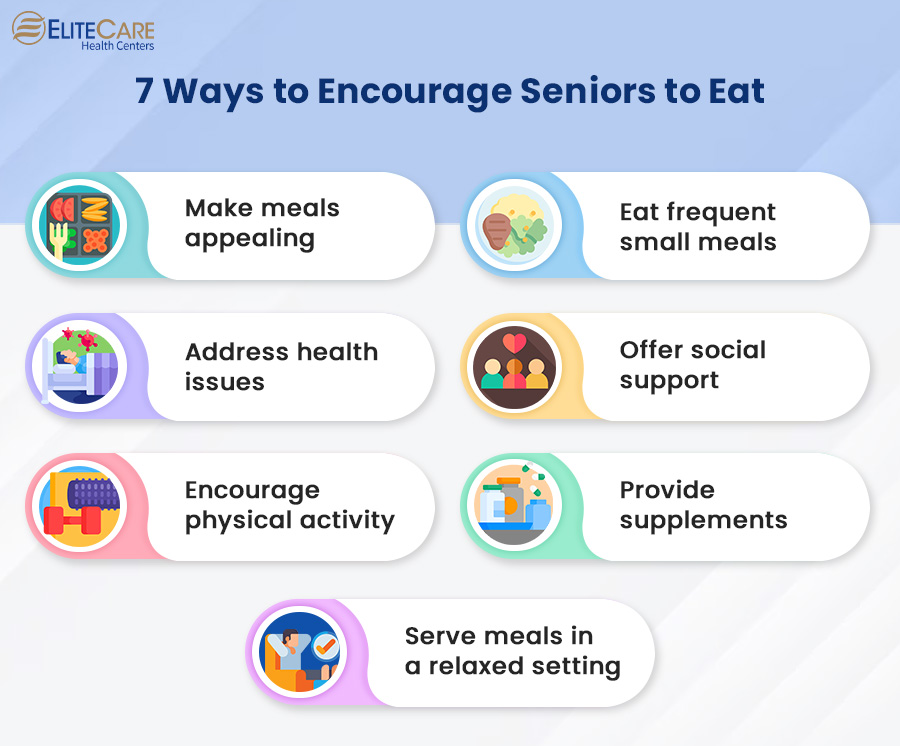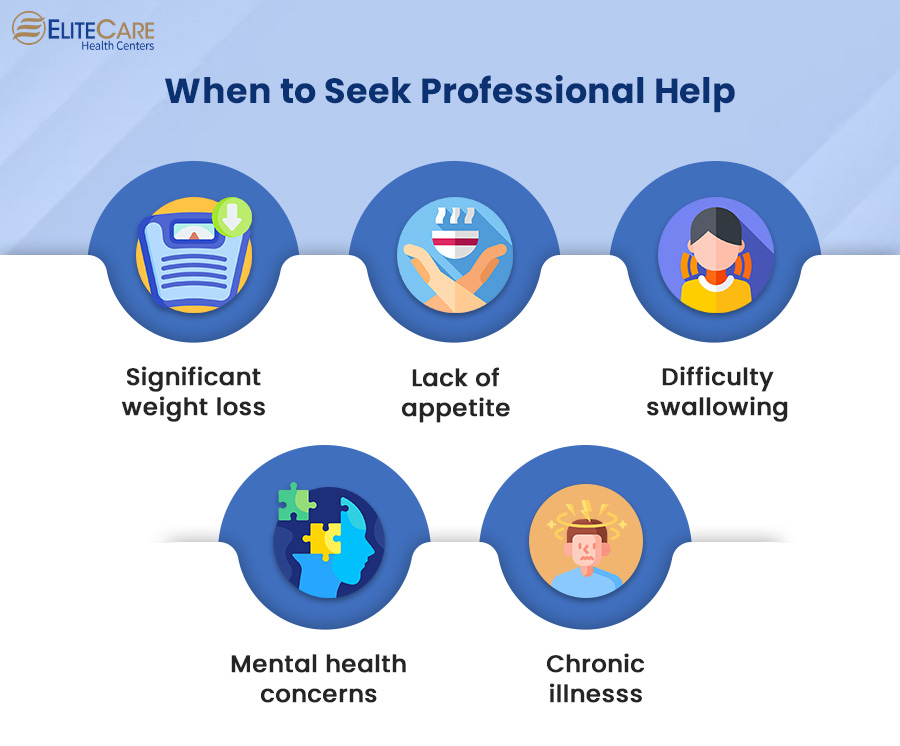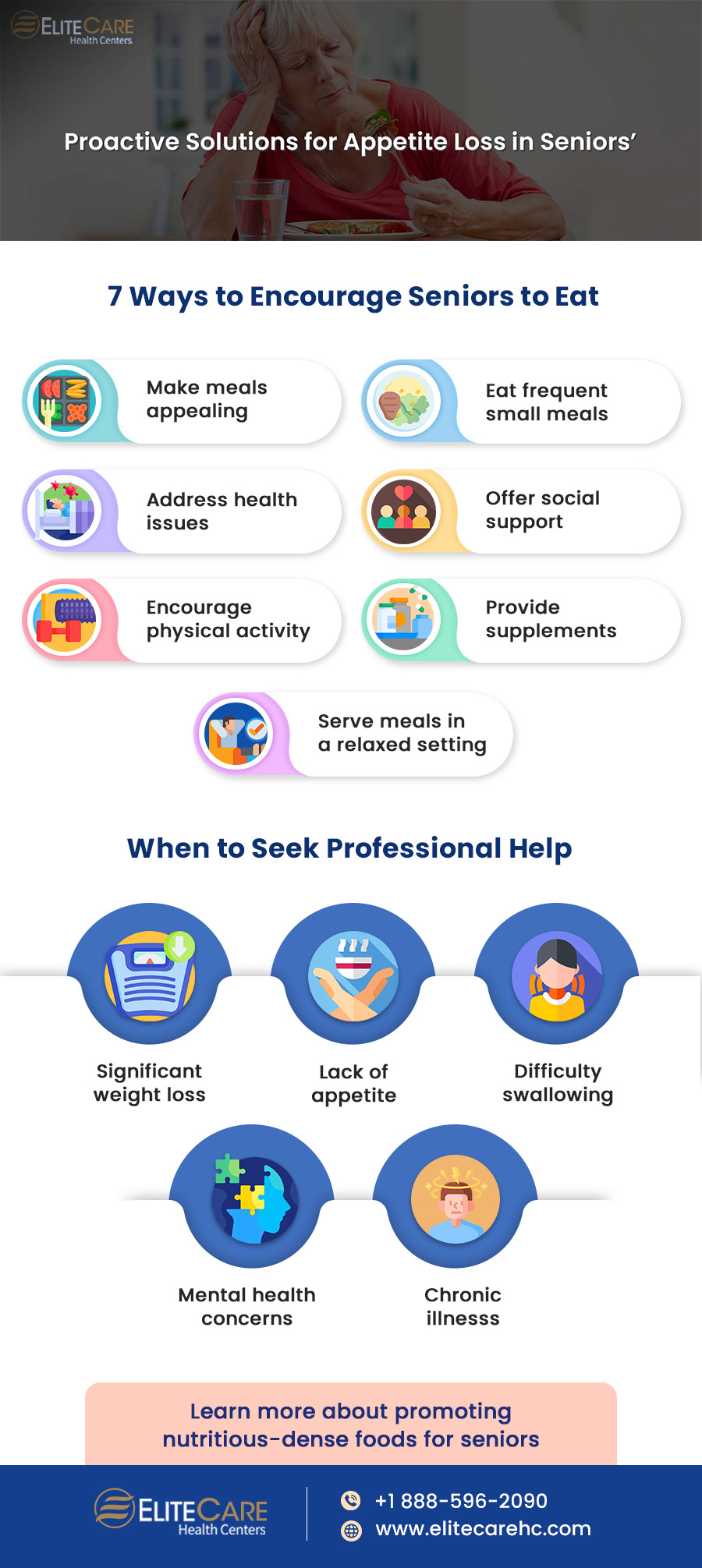
Healthy eating habits are important for mental and physical health. A healthy and balanced meal makes one feel energetic and helps combat various health issues. The body goes through several changes with age, including changes in appetite and taste preferences. Age-related changes can result in seniors having a reduced desire to eat or having difficulty in maintaining a balanced diet. Lack of appetite can lead to malnutrition, weight loss, and other health complications. As a senior or a caregiver, it is essential to know why seniors may lose the urge to eat and to take proactive steps to encourage eating.
Why a Senior May Not Want to Eat
There are many reasons why seniors may not want to eat, and understanding these reasons is important to address the issue. Some of these reasons are as follows:
1. Changes in taste
With age, the sense of taste and smell declines, making food less enjoyable.
2. Medication side effects
Some medications can cause nausea, dry mouth, or other side effects that can decrease appetite.
3. Depression
Often common in seniors, depression can cause a lack of interest in food, among other symptoms.
4. Dental problems
Sometimes, missing teeth or poorly fitting dentures can make eating difficult or painful.
5. Health issues
Various health issues such as cancer, heart disease, and gastrointestinal problems can cause a lack of appetite.
6. Loneliness and social isolation
Seniors who live alone or have limited social interactions may lose interest in eating and cooking for themselves.
Identifying the underlying cause of a senior’s lack of appetite is important to determine the best course of action for addressing the issue.
7 Ways to Encourage Seniors to Eat

Eating regularly with adequate portion sizes and nutrition-dense meals is crucial for seniors to maintain their health and well-being. However, it can be challenging to encourage a senior to eat, especially if they have a lack of appetite or difficulty swallowing. Here are six ways to encourage seniors to eat:
1. Make meals more appealing
Seniors may be more likely to eat if the food looks appealing. Consider using colorful plates and tablecloths, creating a pleasant dining environment, serving food in attractive dishes, and seasoning food with herbs and spices to enhance the flavor.
2. Provide smaller and more frequent meals
With age, older people find trouble eating large meals, so offering smaller, more frequent meals throughout the day can be helpful. This can help prevent feelings of fullness or discomfort after eating. Incorporating snacks such as fruit, cheese, and crackers into the diet can also be a good option.
3. Address underlying health issues
Certain health issues, such as dental problems, medication side effects, and depression, can impact a senior’s appetite. Addressing these issues can help promote healthy eating habits.
4. Offer social support
Seniors may be more likely to eat if they have companionship during meals. Consider eating meals with them or arranging meals for them with friends or family members.
5. Encourage physical activity
Exercise or physical activity can stimulate appetite. Encouraging seniors to engage in light exercises, such as walking or gentle stretching exercises, can help increase their appetite.
6. Provide nutritional supplements
Nutritional supplements can be a good option if a senior is not getting enough nutrients from their diet. Connect with nutritionists or senior care service providers, as they can advise on encouraging healthy eating habits in seniors, including recommendations for nutrient-dense foods and supplements.
7. Serve meals in a pleasant and relaxed atmosphere
Avoid eating meals while watching television or using mobile phones, as this can distract seniors from the eating experience and lead to overeating or undereating.
How to Address Specific Health Issues That Can Impact Appetite
Some strategies for addressing specific health issues in seniors are as follows:
1. Dental issues
If a senior is experiencing dental problems, such as missing teeth or poorly fitting dentures, it can be difficult or painful for them to eat. To address this issue, caregivers can help seniors schedule dental appointments at our health care center. Also, seniors should have soft or pureed foods that are easier to eat.
2. Medication side effects
Schedule an appointment at the nearest Elite Care medical clinic for a complete review of all medications being taken, in order to determine the leading cause of a loss of appetite or other troubling side effects. The senior care service provider can adjust medication dosages or switch to alternative medications.
3. Depression
According to the National Council of Aging, approx. 28% of older adults go through major depression. Loneliness sometimes leads to depression and can make mealtimes less enjoyable. Share meals with seniors whenever possible or invite some of their friends and family to join them. Seniors can also engage in small activities such as playing soothing music, lighting candles, going for a walk, or practicing habits that they enjoy the most. If the issue continues, encourage seniors to seek mental health support at senior health care centers. Therapy or counseling can help address the underlying causes of depression and promote healthy eating habits.
4. Gastrointestinal problems
Constipation, acid reflux, or nausea can contribute to seniors’ lack of appetite. Try making dietary modifications, such as increasing fiber intake or avoiding trigger foods, and seeking medical treatment when necessary.
5. Cognitive decline
Seniors with cognitive decline, such as dementia, may have difficulty remembering to eat or forget that they have already eaten. Caregivers can help by providing reminders and creating a routine around mealtimes.
When to Seek Professional Help

While there are many strategies that caregivers can use to encourage seniors to eat, there may be times when it’s necessary to seek professional help from a senior care service provider. Situations in which seeking professional help may be beneficial are as follows:
1. Significant weight loss
A body weight loss of 5% or more within 6 to 12 months is generally considered significant. Losing weight over a short period may indicate underlying health issues, such as malnutrition, cancer, dementia, or other chronic health problems requiring medical assistance.
2. Persistent lack of appetite
If a senior has had persistent lack of appetite for an extended period, despite efforts to encourage eating, it may be necessary to seek professional help to identify and address the underlying issue. A healthcare professional can evaluate the senior’s overall health and determine the underlying cause of the lack of appetite. Addressing a persistent lack of appetite in seniors is important because it can lead to malnutrition, weight loss, and other health complications.
3. Difficulty swallowing
Also known as dysphagia, it is a common issue among seniors. Various factors, such as neurological disorders, muscular disorders, or narrowing of the esophagus, can cause dysphagia. It’s important to address difficulty swallowing in seniors because it can lead to malnutrition, dehydration, and an increased risk of choking or aspiration pneumonia.
Read More: What Is Choking? 4 Ways to Deal with Choking
4. Mental health concerns
Depression and anxiety can significantly impact seniors’ appetite and eating habits. Depression can cause a loss of appetite, while anxiety can lead to an increased appetite or a tendency to overeat. Both conditions can also affect how a senior perceives food taste and enjoyment.
5. Chronic illness
Seniors with chronic illnesses, such as heart disease or diabetes, may benefit from working with a nutritionist or dietitian to develop a diet plan that supports their overall health. It’s also important to address any pain, discomfort, or other symptoms associated with chronic illness to help improve a senior’s overall well-being. This may involve medication management or other supportive therapies, such as physical or occupational therapy.
Overall, seeking professional help can be beneficial in addressing underlying health issues and promoting healthy eating habits in seniors. Consulting with our health care center physician, nutritionist, or therapist can guide managing medical conditions, developing a healthy diet plan, and addressing mental health concerns that may impact a senior’s appetite.
Conclusion
Taking proactive steps to help seniors maintain a healthy diet is crucial, as good nutrition is essential for overall health and well-being. Connect with physicians at our medical clinics located all over Florida, if the signs are persistent and seniors are reluctant to eat. Elite Care Health Centers focuses on the well-being of older adults by addressing these issues and providing support to help seniors overcome all health problems.






